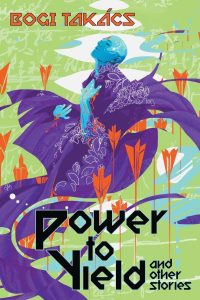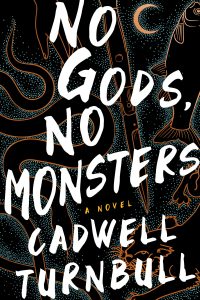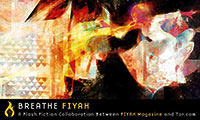Ian Mond Reviews Power to Yield by Bogi Takács
 Power to Yield, Bogi Takács (Broken Eye Books 978-1-40372-266-2, $17.99, 203pp, tp) February 2024.
Power to Yield, Bogi Takács (Broken Eye Books 978-1-40372-266-2, $17.99, 203pp, tp) February 2024.
Hungarian American poet, writer, translator, critic, and editor Bogi Takács has spent eir career promoting, encouraging, and showcasing the work of marginalised authors. The anthology Rosalind’s Siblings, edited by Takács and publishing poetry and fiction focusing on scientists erased or diminished because of their gender or sexuality, fittingly featured on the 2023 Locus Recommended Reading List. Given all e does (including maintaining a Patreon), I’m a little amazed that Takács finds the time to steadily grow a catalogue of stories, eleven of which form part of eir terrific second collection, Power to Yield and Other Stories. With a mix of fantasy and science fiction, often both in the same story, Takács puts front and centre those perspectives, those voices, that still rarely get heard.
In her well-considered Foreword, Ada Hoffman praises Takács’s ability to embrace and occupy diverse perspectives, including “aliens, machines, spiritual beings, plants, animals, monsters and humans alike.” Hoffman goes on to say that central to “leaping into” these different “guises” is a desire to bridge the gap “across impossible gulfs of difference.” While I agree with Hoffman, what struck me was how compassionate these stories are, especially the pieces where the narrator is treated as “different.” Take the opening tale, “Four-Point Affective Treatment”, in which our unnamed protagonist is assigned to have their emotional states read by a device that will be used to communicate with visitors from another world. The story starts with a flurry of angry thoughts; the narrator is pissed at how people make assumptions about their gender and their religion. And yet, we’re not repelled. We don’t, as the narrator suggests, label them a “‘TERRORIST’ in neat, tidy small capitals” because they’re angry or wearing a headdress. We share their frustrations, and later, towards the story’s end, we share their joy as they imagine what their work will mean for the newly arrived aliens. This deep sense of empathy for the “other” is likewise apparent in “An Errant Holy Spark” and “Volatile Patterns”. In the former, a kidnapped AI construct chronicles their development, their deeply held Jewish beliefs, and their unique connection with visiting extraterrestrials. The latter, a delightfully frothy tale, sees two Ereni “wizards” sent to a planet to investigate why the populace seems cursed, only to be treated with scepticism and disdain.
Several of my favourite stories are those that, as Hoffman remarks, seek to find common ground “across impossible gulfs of difference.” I adored “The 1st Interspecies Solidarity Fair and Parade”, which has scads of charm despite its postapocalyptic setting. Having survived two alien invasions – “the first group of aliens destroyed everything… the second group came to pick up the scraps” – humanity is now dealing with a third group of aliens, “a wide variety of species,” who have come to Earth seeking refuge, having themselves been invaded. The story is told from the perspective of a human volunteer with disabilities who, along with their alien companion, “a giant metallic sphere,” is roving the Hungarian countryside, screening the locals, hoping to find someone suitable to be recruited for the alien communications team. But with the locals justifiably suspicious, a festival is mooted, complete with parade floats, to muster interest. The story made me smile; it made me laugh. I also got a kick out of “A Technical Term, Like Privilege”, mostly because of the wild premise. Rather than pay rent, people agree to have their apartment suck their blood (not for the blood, but the magical energy it contains). The story has a political bite (the narrator starts pushing against this forced blood-giving) and a climax that generates a sense of awe. But the story I loved the most, that exemplified everything distinctive about this collection, is “And I Entreated”. Like “A Technical Term, Like Privilege,” the premise is gloriously surreal. Shoshana is a counterintelligence agent “painstakingly transformed” into a houseplant for a mission. Still stuck as a houseplant on returning home – there’s a delay in getting a Shapeshifter to change her back – Shoshana’s husband, Doron, puts her in their son’s room, where she hears Gil practice his bar mitzvah portion and tries to communicate with her family. Despite the centrality of Jewish authors to the field, my faith is rarely represented. So, to have two stories – this one and “An Errant Holy Spark” – portray Judaism with tenderness, authenticity, and beauty is overwhelming. What I found especially moving in “And I Entreated” (apart from the Talmudic discussion), is Takács’s sensitive portrayal of Doron, an orthodox Jewish man struggling to find the right words, the language, to communicate with his trans son.
The title story, a novella, is the one piece I struggled with. Set on the small planetoid of Ereni, the magical forces that saturate the world produce monsters and horrors if left untamed. The System that controls these forces requires an individual, hardened by lashings of pain, to handle the torrent of energy. My issue here is entirely personal. I find it difficult to read stories where people are repeatedly tortured, even if the pain-giving is consensual (which is the case in this story). But what’s interesting is that as dark as this piece is, with echoes of Le Guin’s “The Ones Who Walk Away from Omelas”, the inherent kindness and grace that underlines everything Takács writes means the torture scenes never feel gratuitous, but rather a mode of expression, intimate and intense, shared between the story’s main characters. If anything, the novella reinforces the need for more writers like Takács who can embrace different “guises” and view the world from multiple perspectives.
Ian Mond loves to talk about books. For eight years he co-hosted a book podcast, The Writer and the Critic, with Kirstyn McDermott. Recently he has revived his blog, The Hysterical Hamster, and is again posting mostly vulgar reviews on an eclectic range of literary and genre novels. You can also follow Ian on Twitter (@Mondyboy) or contact him at mondyboy74@gmail.com.
This review and more like it in the April 2024 issue of Locus.
 While you are here, please take a moment to support Locus with a one-time or recurring donation. We rely on reader donations to keep the magazine and site going, and would like to keep the site paywall free, but WE NEED YOUR FINANCIAL SUPPORT to continue quality coverage of the science fiction and fantasy field.
While you are here, please take a moment to support Locus with a one-time or recurring donation. We rely on reader donations to keep the magazine and site going, and would like to keep the site paywall free, but WE NEED YOUR FINANCIAL SUPPORT to continue quality coverage of the science fiction and fantasy field.
©Locus Magazine. Copyrighted material may not be republished without permission of LSFF.






